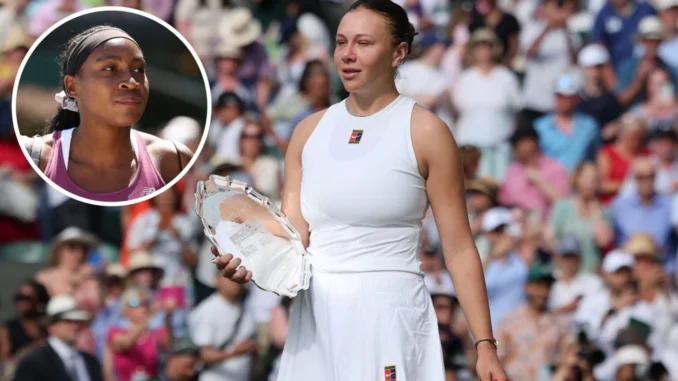
On a historic day at the All England Club, July 12, 2025, Amanda Anisimova faced a formidable challenge in her first Grand Slam final, falling to Iga Swiatek in a swift 57-minute match that ended with a rare 6-0, 6-0 scoreline. The women’s singles final at Wimbledon 2025 marked the first double bagel in the tournament’s Open Era history, a result not seen since 1911. As Anisimova stood on Centre Court, visibly emotional and receiving a standing ovation from the supportive crowd, her compatriot and fellow American tennis star Coco Gauff was quick to offer words of encouragement, showcasing the camaraderie that defines the sport’s next generation.
Moments after the match concluded, Gauff, the reigning French Open champion and World No. 2, took to social media to uplift Anisimova. “So much to be proud of Amanda, keep your head up 👑,” she wrote, punctuating her message with heart and crown emojis. The gesture was not just a show of support but a recognition of Anisimova’s remarkable journey to the final, a milestone that came just two years after she took an eight-month hiatus from tennis in 2023 to prioritize her mental health. Gauff, who has faced Anisimova since their junior days, including a loss to her in the 2017 US Open junior final, understands the pressures of the sport and the significance of her compatriot’s resurgence. “I just wanna hug Amanda,” Gauff added in a follow-up post, joined by other players like Nick Kyrgios in rallying around Anisimova during a tough moment.
Anisimova’s path to the Wimbledon final was nothing short of inspiring. The 23-year-old American, seeded 13th, stunned the tennis world by defeating World No. 1 Aryna Sabalenka in a gripping 6-4, 4-6, 6-4 semifinal victory, showcasing her powerful backhand and relentless return game. “This doesn’t feel real right now. Aryna is such a tough competitor. I was absolutely dying out there,” Anisimova said after her semifinal triumph, her voice filled with emotion. Her run to the final, which included saving 11 of 14 break points against Sabalenka, marked her as the first American woman to reach the Wimbledon singles final since Serena Williams in 2019. It was a testament to her resilience, especially after failing to qualify for the tournament in 2024, when her ranking had plummeted to 191st. “Just me being able to prove that you can get back to the top if you prioritize yourself — that’s been incredibly special to me,” she reflected, addressing the doubters who questioned her return after her mental health break.
Swiatek, however, was unrelenting in the final, leveraging her newfound grass-court prowess to dominate with a 78% first-serve percentage and just 13 unforced errors. Anisimova, overwhelmed by nerves, managed only 24 points to Swiatek’s 55, with 28 unforced errors sealing her fate. “She came out playing very, very well,” Anisimova said post-match, her voice breaking as she gave credit to Swiatek. “So all the credit to her. She was able to really play the game she wanted.” Despite the loss, Anisimova’s performance throughout the tournament propelled her into the WTA Top 10 for the first time, a career-high ranking that signals her potential for future major success.
Gauff’s support extended beyond Anisimova to Swiatek, whom she congratulated for her first Wimbledon title. “Congratulations @iga_swiatek on an incredible run!” Gauff posted, acknowledging the Polish star’s historic achievement as the first woman since Ash Barty to win majors on all three surfaces. Gauff’s own Wimbledon campaign ended abruptly with a first-round loss to Dayana Yastremska, a 7-6(3), 6-1 defeat that left her reflecting on the challenges of transitioning from clay to grass. “Mentally I was a little bit overwhelmed with everything that came afterwards,” she admitted, referencing the media duties and whirlwind following her French Open victory. Yet her quick response to Anisimova’s defeat highlighted her maturity and empathy at just 21 years old.
The tennis community, including former players like Serena Williams’ ex-coach Rennae Stubbs, also celebrated Anisimova’s run, with Stubbs noting the potential for American women to “clean sweep” the 2025 majors after Madison Keys’ Australian Open win and Gauff’s French Open triumph. Anisimova’s journey, from a mental health break to a Wimbledon final, resonates as a powerful narrative of perseverance. As Gauff’s message underscored, Anisimova’s tears on Centre Court were not just of defeat but of a hard-fought comeback, one that promises more chapters in her inspiring career.
Leave a Reply